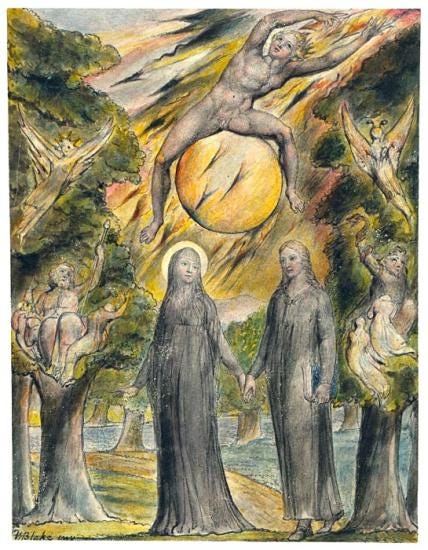Mystic dog with paws of fire
The scorching noonday sun is a joyous canine menace in this poem, 'Noon' (1918), by Harindranath Chattopadhyaya
The noon, a mystic dog with paws of fire, Runs through the sky in ecstasy of drouth, Licking the earth with tongue of golden flame Set in a burning mouth. It floods the forest with loud barks of light, And chases its own shadow on the plains . . . Its Master silently hath set it free Awhile from silver chains. At last, towards the cinctured end of day, It drinks cool draughts from sunset-mellowed rills . . . Then, chained to twilight by the Master’s hand, It sleeps among the hills.
What we love about this passage…
This arresting poem is one of five ‘Songs of Sunlight’ that describe the moving light of a day. ‘Noon’ brings immediate riotous light, disruptive heat, and a zoomorphic landscape full of this vast mystic dog, expressing its joy in synesthetic “barks of light”. In this image we hear the inescapable heat of the sun chasing shade from even the dark cools of the forest.
The sun dog’s raw power is without malice, the “ecstasy of drouth” (drought) it brings with it is simply a result of its unchained fiery nature, held in check only by the Master’s hand.

About the Author
Harindranath Chattopadhyaya (1898-1990) was born in Hyderabad. His parents were Bengali and his father took a degree at the University of Edinburgh; he dedicated his first collection of poetry to them. Younger brother of Sarojini Naidu, the first Indian woman president of the Indian National Congress, Harindranath Chattopadhyaya pursued a highly creative life as a poet, actor, dramatist, musician, and politician.
He wrote poetry from his youth, publishing his first collection at age 19, The Feast of Youth, from which ‘Noon’ is taken. His work was celebrated by Laurence Binyon, with whom he corresponded about publishing work when he later lived in London, and by the Nobel Laureate Rabindranath Tagore. James H. Cousins, in a foreword to The Feast of Youth, described him admiringly as ‘a true bearer of the Fire’.
To Read Alongside…
Harindranath also enjoyed acting from a young age and had success as an actor in a number of Hindi films, often reprising a comic role as a disgruntled and strong-willed patriarch (most famously as ‘Daduji’ in Bawarchi (‘The Chef’) (1972, dir. Hrishikesh Mukherjee). An unusual read alongside might be watching the film Tere Ghar Ke Samne (1963) (in English: ‘In Front of your House’), a romantic comedy directed by Vijay Anand, in which Harindranath Chattopadhyaya plays one half of a fierce rivalry of neighbours, whose respective son and daughter fall in love with each other!
You could also read the work of Rabindranath Tagore (whose work Yeats also adored). His collection Gitanjali was translated by the poet himself into English as Song Offerings (1912), the collection that prompted his Nobel Prize for Literature.
Suggest a LitHit!
Tell us your own favourites from literature you've read, and we can feature you as a Guest Curator if you like. Just email us with the following information:
Your full name
The title of the book you're suggesting
The location of the excerpt within the book (e.g., "in the middle of chapter 5"), or the excerpt itself copied into the email or attached to it (in Word)
Why you love it, in just a few sentences
About LitHits
LitHits helps you make time for reading by bringing you unabridged excerpts from brilliant literature that you can read on the go, anytime or any place. Our curators carefully select and frame each excerpt so that you can dive right in. We are more than a book recommendation site: we connect you with a powerful, enduring piece of literature, served directly to your mobile phone, tablet or computer.
Today's guest curator...
Dr Alexandra Paddock is a core member of LitHits and an expert in medieval literature, ecocriticism, and animal studies. This latter interest frequently takes her into post-medieval literary moments.
You might also enjoy...
Feedback
We'd love to hear your thoughts on our newsletter:
kshepherdb@yahoo.co.uk
Graphic design by Sara Azmy
All curation content © 2024 LitHits. All rights reserved.



